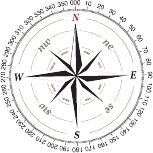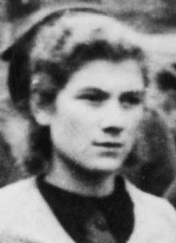Molotov, Viacheslav, born 09-03-1890 in Kukarka, Russia,  , the son of a butter churner. Contrary to a commonly repeated error, he was not related to the composer Alexander Scriabin
, the son of a butter churner. Contrary to a commonly repeated error, he was not related to the composer Alexander Scriabin  . He was one of ten children (three of whom died at a young age) from salesman Mikhail Prochorovich Skrjabin and mother Anna Jakovlevna, born Nebogatikova, who came from a rich trading family.In the summer of 1906 he became a member of the Bolshevik Group of the Russian Social-Democratic Workers’ Party (RSDAP).
. He was one of ten children (three of whom died at a young age) from salesman Mikhail Prochorovich Skrjabin and mother Anna Jakovlevna, born Nebogatikova, who came from a rich trading family.In the summer of 1906 he became a member of the Bolshevik Group of the Russian Social-Democratic Workers’ Party (RSDAP).  He then began distributing political pamphlets under the pseudonym Molotov (from the Russian word molot; “hammer”), focusing on illegal revolutionary activities such as organizing students for Bolshevism. In 1909 he was arrested and exiled for two years to Vologda. After his release in 1911 (according to other sources in 1912) he enrolled in the Economics faculty of the Polytechnic Institute of St Petersburg where he completed only two courses. Here he again engaged in revolutionary activities; in 1912 he became a writer (secretary) for the editorial staff of the underground Bolshevik newspaper Pravda (which Jozef Stalin also wrote for). He also did party work in St Petersburg and Moscow. His activities led to his arrest and a new exile in 1915, this time to a prison camp in the Irkutsk government. In 1916 he escaped, returned to the capital, St. Petersburg, and from that time took the pseudonym “Molotov” for good. Throughout his teen years, he was described as “shy” and “quiet”, always assisting his father with his business. He was educated at a secondary school in Kazan, soon gravitating toward that organisation’s radical Bolshevik faction, headed by Vladimir Iljits Lenin
He then began distributing political pamphlets under the pseudonym Molotov (from the Russian word molot; “hammer”), focusing on illegal revolutionary activities such as organizing students for Bolshevism. In 1909 he was arrested and exiled for two years to Vologda. After his release in 1911 (according to other sources in 1912) he enrolled in the Economics faculty of the Polytechnic Institute of St Petersburg where he completed only two courses. Here he again engaged in revolutionary activities; in 1912 he became a writer (secretary) for the editorial staff of the underground Bolshevik newspaper Pravda (which Jozef Stalin also wrote for). He also did party work in St Petersburg and Moscow. His activities led to his arrest and a new exile in 1915, this time to a prison camp in the Irkutsk government. In 1916 he escaped, returned to the capital, St. Petersburg, and from that time took the pseudonym “Molotov” for good. Throughout his teen years, he was described as “shy” and “quiet”, always assisting his father with his business. He was educated at a secondary school in Kazan, soon gravitating toward that organisation’s radical Bolshevik faction, headed by Vladimir Iljits Lenin

 Molotov was a Soviet political leader. A member
Molotov was a Soviet political leader. A member  of the Bolsheviks from 1906, he worked in provincial Communist Party organizations from 1917. A staunch supporter of Joseph Stalin,
of the Bolsheviks from 1906, he worked in provincial Communist Party organizations from 1917. A staunch supporter of Joseph Stalin, 

 he became secretary of the Central Committee in 1921
he became secretary of the Central Committee in 1921 
 Promoted to the Politburo in 1926, he purged the Moscow party organization of anti-Stalinists (1928 – 30). He
Promoted to the Politburo in 1926, he purged the Moscow party organization of anti-Stalinists (1928 – 30). He



 served as prime minister (1930 – 41) and as the country’s foreign minister (1939 – 49, 1953 – 56). He negotiated the German-Soviet Nonaggression Pact in 1939, with Joachim von Ribbentrop,
served as prime minister (1930 – 41) and as the country’s foreign minister (1939 – 49, 1953 – 56). He negotiated the German-Soviet Nonaggression Pact in 1939, with Joachim von Ribbentrop,

 and in World War II he ordered the production of the crude bottle bombs later called “Molotov cocktails.”
and in World War II he ordered the production of the crude bottle bombs later called “Molotov cocktails.” He arranged the alliances with the U.S. and Britain and was the Soviet spokesman at the Allied conferences during and after the war. After being dismissed in 1956 by Nikita Khrushchev,
He arranged the alliances with the U.S. and Britain and was the Soviet spokesman at the Allied conferences during and after the war. After being dismissed in 1956 by Nikita Khrushchev, 
 Molotov joined an unsuccessful attempt to depose Khrushchev (1957) and lost all his party offices; in 1962 he was expelled from the Communist Party.
Molotov joined an unsuccessful attempt to depose Khrushchev (1957) and lost all his party offices; in 1962 he was expelled from the Communist Party.
Molotov was marride to Polina Semyonovna Zhemchuzhina and they had one daughter


 She was arrested for treason in December 1948, as she openly supported the idea of granting the region of Crimea to Jews, consequently being forced into an unwanted divorce from Μolotov. She was convicted and sentenced to five years in a labour camp. After the death of Stalin in March 1953, she was released from captivity by Lavrentiy Beria
She was arrested for treason in December 1948, as she openly supported the idea of granting the region of Crimea to Jews, consequently being forced into an unwanted divorce from Μolotov. She was convicted and sentenced to five years in a labour camp. After the death of Stalin in March 1953, she was released from captivity by Lavrentiy Beria 
 and reunited with her husband. Her first question upon her release was “How’s Stalin?” Upon being told he had died only days before, she fainted.
and reunited with her husband. Her first question upon her release was “How’s Stalin?” Upon being told he had died only days before, she fainted.
Happily and lovingly reunited, Polina Zhemchuzhina and her husband lived in the Granovsky apartment block near the Kremlin. She died of natural causes on 01-04-1970, age 74..
Death and burial ground of Molotov, Viacheslav Mikhailovich.



 Viascheslav Molotov died, during the rule of Mikhail Gorbachev, on 08-11-1986. He
Viascheslav Molotov died, during the rule of Mikhail Gorbachev, on 08-11-1986. He  was 96 years old at the time of his death, and was buried at the Novodevichy Cemetery, Moscow, close to the grave of Khrutschev. Close by the graves of the Ukrainian writer and war-inciter, he came with the shout ”Kill the Germans”, Ilya Ehrenburg), General and Commander of the 3rd Belorussian Front, who died from wounds received outside Königsberg at age 39, General Ivan Chernakhosky, the Red Army’s 3rd Tank Army commander, Generaloberst Pavel Semjonovich Rybalko,
was 96 years old at the time of his death, and was buried at the Novodevichy Cemetery, Moscow, close to the grave of Khrutschev. Close by the graves of the Ukrainian writer and war-inciter, he came with the shout ”Kill the Germans”, Ilya Ehrenburg), General and Commander of the 3rd Belorussian Front, who died from wounds received outside Königsberg at age 39, General Ivan Chernakhosky, the Red Army’s 3rd Tank Army commander, Generaloberst Pavel Semjonovich Rybalko, 
 Air Marshal, Ivan Mykytovych Kozhedub,
Air Marshal, Ivan Mykytovych Kozhedub,  the defender of Moscow, General Lev Dovator
the defender of Moscow, General Lev Dovator 
 and Commanding General of the 1st Belorussian’s 3rd Shock Army. Vasily Kuznetsov.
and Commanding General of the 1st Belorussian’s 3rd Shock Army. Vasily Kuznetsov.

The Molotov cocktail is a term coined by the Finns during the Winter War, as a generic name used for a variety of improvised incendiary weapons.[100] During the Winter War, the Soviet air force made extensive use of incendiaries and cluster bombs against Finnish troops and fortifications. When Molotov claimed in radio broadcasts that they were not bombing, but rather delivering food to the starving Finns, the Finns started to call the air bombs Soon they responded by attacking advancing tanks with “Molotov cocktails,” which were “a drink to go with the food.” According to Montefiore, the Molotov cocktail was one part of Molotov’s cult of personality that the vain Premier surely did not appreciate.”
Radek Hroch, my friend from the Chech Republic, visited the graveside and sent me the photo of Molotov’s and his wife’s grave..


Message(s), tips or interesting graves for the webmaster: robhopmans@outlook.com






















Leave a Reply